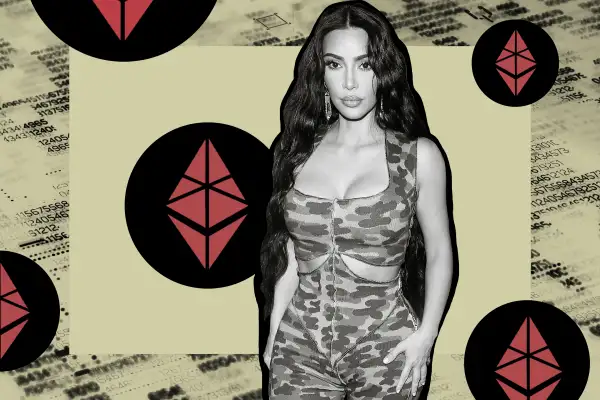Kim Kardashian Is in Trouble for Promoting Crypto on Instagram
Money is not a client of any investment adviser featured on this page. The information provided on this page is for educational purposes only and is not intended as investment advice. Money does not offer advisory services.

Reality star Kim Kardashian landed in the middle of yet another scandal this week — but it has nothing to do with her sisters, Kanye West or losing a diamond earring in the ocean.
This time, crypto is driving the drama.
Kardashian got mentioned by name Monday in a speech by the chairman of the Financial Conduct Authority, which is a regulator that oversees about 51,000 businesses in the United Kingdom. Speaking at the Cambridge International Symposium on Economic Crime, Charles Randell used the socialite-turned-billionaire to push for more rules around crypto tokens and social media ads promoting cryptocurrencies.
Specifically, Randell criticized an Instagram story Kardashian shared in June advertising the yield-based token Ethereum Max.
"When she was recently paid to ask her 250 million Instagram followers to speculate on crypto tokens by 'joining the Ethereum Max Community', it may have been the financial promotion with the single biggest audience reach in history," Randell said. "She disclosed that this was an #AD. But she didn’t have to disclose that Ethereum Max — not to be confused with Ethereum — was a speculative digital token created a month before by unknown developers — one of hundreds of such tokens that fill the crypto-exchanges."
Cryptocurrencies, celebrities and scams
Though he admitted he doesn't know whether Ethereum Max is a scam, Randell took aim at influencers who get paid by fraudsters to "help them pump and dump new tokens on the back of pure speculation." Speculative trading involves buying and selling futures based on what investors think the price of an asset (in this case, digital coin) will do. It's generally seen as an unpredictable practice.
Randell argued that ads like Kardashian's don't accurately explain the risks involved with crypto assets. While experienced investors immersed in the r/Bitcoin subreddit may grasp the nuances, people casually checking Instagram while on a break from work may not.
In addition to Kardashian, former basketball player Paul Pierce and boxer Floyd Mayweather have both promoted Ethereum Max.
"The hype around them generates a powerful fear of missing out from some consumers who may have little understanding of their risks," he added. "There is no shortage of stories of people who have lost savings by being lured into the cryptobubble with delusions of quick riches, sometimes after listening to their favorite influencers, ready to betray their fans’ trust for a fee."
Ethereum Max, for its part, wrote in a statement to Money that "altcoins in general are speculative," but it's committed to transparency.
"A lot of our marketing and PR initiatives are to first gain eyes and interest in our project. These efforts are always from an awareness perspective, and not encouraging to purchase — as the Kim K post was simply intended to raise awareness of the project and its utility," it said, adding that the goal is to "encourage people to research our project, speak with the community, get involved and ask questions before making a decision."
Speculative trading and crypto tokens don't get a lot of love on our side of the pond, either. In the U.S., Securities and Exchange Commission chairman Gary Gensler has called crypto "the Wild West" because there's a lot of abuse and not much trustworthy information. Between October 2020 and May 2021, almost 7,000 Americans reported losses of more than $80 million on crypto-related scams, according to the Federal Trade Commission.
Like Randell, Gensler also called for more regulation in a May interview with CNBC.
"We need to update and freshen our rules to ensure that, while retail investors and any individual has First Amendment rights to speak and so forth, that they’re not misleading the public, they’re not manipulating the public, manipulating the markets," he said.
A good approach: Research anything before you put your money into it, avoid schemes that "guarantee" you can get rich quick, and don't take financial advice from strangers online.
More from Money:
There Are Now More Crypto Coins Than U.S Stocks
How to Avoid This Common Cryptocurrency Investing Mistake
Mark Cuban and Elon Musk Agree on the Merits of Dogecoin. Crypto Experts Have a Different Opinion
